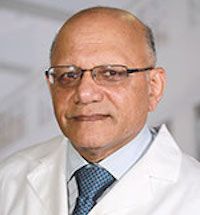Vosevi, Mavyret Report Strong HCV Efficacy in Real-World Setting
Investigators praised the excellent effectiveness of both therapies, but advised care regarding the increased odds of adverse events requiring hospitalizations.

Varun Saxena, MD
A new clinical trial has backed the efficacy of sofosbuvir/velpatasvir/voxilaprevir (S/V/V) and glecaprevir/pibrentasvir (G/P) for the treatment of hepatitis C virus (HCV)—complementing ongoing clinical pursuits for real-world data backing either therapy for the infection.
In a new study presented at the American Association for the Study of Liver Diseases (AASLD; Liver Meeting) in San Francisco, CA, this week, investigators led by Varun Saxena, MD, of the University of California San Francisco and Kaiser Permanente Northern California, assessed both therapies in 277 patients.
S/V/V (Vosevi; Gilead Sciences) was originally approved as a combination therapy for HCV by the US Food and Drug Administration in July 2017, while G/P (Mavyret; AbbVie) received FDA backing in the following month.
The investigators’ cohort analysis of adult patients with HCV treated at the Kaiser Permanente facility assessed efficacy as sustained virologic response (SVR) at 4 and 12 weeks, and safety as adverse events (AEs) required hospitalization in the 12 weeks following treatment. Patients had been administered either S/V/V or G/P, with or without add-on ribavirin (RBV). Multivariate logistic regression was used to identify factors associated with AEs.
At baseline, mean patient age was 63 years, with 25% reported as female, 19% as black, and 14% as Hispanic. Comorbidities were frequent in patients—54% reported hypertension, 23% diabetes, 21% hyperlipidemia, and 3% HIV. Median patient body mass index (BMI) was 29.
Regarding HCV characteristics, almost all patients were either genotype 1 (76%) or 3 (17%), and 46% suffered from cirrhosis. Another 85% of patients were treatment experienced, with a strong majority having been exposed to direct-acting antiviral (DAA) therapy.
Most patients (n= 227; 82%) were administered S/V/V (9% with RBV) for 12 weeks, while just 50 (18%) were administered G/P (2% with RBV)—the latter group treated for either 8 (34%), 12 (56%), or 16 (10%) weeks.
Investigators reported a low rate of treatment discontinuation—just 3 patients administered S/V/V, none related to the therapy itself. Only 21 (8%) of patients experienced AEs requiring hospitalization, with the most common reasons being infection (38%) or hepatic decompensation (24%). When adjusting for patient demographics, HIV infection, treatment regimen, and RBV use, patients with decompensated cirrhosis reported greater odds of AEs requiring hospitalization than patients with compensated/non-cirrhosis (OR 4.6; 95% CI: 1.0 - 20.8).
At the time of the last patient follow-ups, a majority (148; 53%) of patients had reached SVR by week 4, and a similar rate (128; 46%) had reached by week 12. Investigators reported that 100% of patients administered G/P reported SVR at weeks 4 and 12, and that 99% and 98% of patients administered S/V/V reported such rates at those weeks, respectively.
Investigators praised the “excellent effectiveness” of both therapies, but advised care regarding the increased odds of AEs requiring hospitalizations.
“We suggest caution if proceeding with protease-inhibitor regimens among decompensated cirrhosis patients,” Saxena and colleagues concluded. “Baseline albumin could be useful in identifying those at higher risk for AEs requiring hospitalization.”
The study, "Real-World Safety and Effectiveness of Sofosbuvir/Velpatasvir/Voxilaprevir and Glecaprevir/Pibrentasvir in Hepatitis C Infected Patients," was presented at the Liver Meeting in San Francisco, CA.